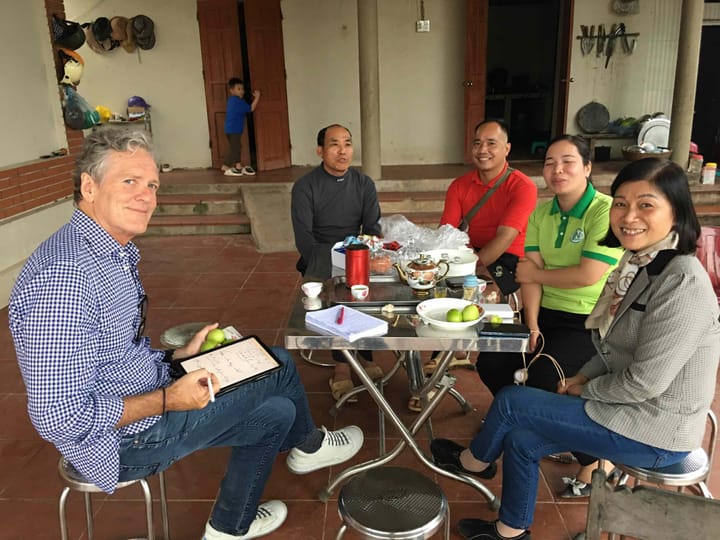Supporting Public-Private Partnerships for Industry Development

Dealing with the practical problems private firms face when nurturing innovative processes; lessons from Rwanda
Industry development and commercial innovation are often presented in idealised terms, focusing on shiny new start-ups and ignoring the struggle of existing firms. It is challenging to understand the practical problems of private firms face and use this information to nurture innovative processes to take business to the next level.
Over the last two years, I have provided technical advice to an industrial development program in Rwanda. On 30 August 2019, I presented some of the key lessons learned from this program in Kigali, which I think may be of interest to a broader audience.
Capacity Building for Industrial Research and Development
I supported the program, known as ‘Capacity Building for Industrial Research and Development in Rwanda’, by advising on and coordinating program inputs and providing quality assurance.
The Korean International Cooperation Agency(KOICA) funded the program and the United National Industrial Development Organization (UNIDO) implemented it.
The program sought to improve the competitiveness of new and existing Rwandan industries to increase their export potential and their potential to substitute imports through increased local production. Support was provided to Rwanda enterprises in selected value chains to access technology to improve their competitiveness in national and international markets.
National Industrial Research and Development Agency
The Government of Rwanda established the National Industrial Research and Development Agency (NIRDA) in 2013 to support the diversification of the Rwandan economy. The new NIRDA replaced the Institute of Scientific and Technological Research and was more focused on industrial development concerns.
Following a review of its strategy and structure, the KOICA-UNIDO program supported the preparation of a new NIRDA strategy. The strategy repositions NIRDA in the national industrial landscape and establishes a more demand-driven approach to industrial development. Aligned with national policies and industrial priorities–such as Vision 2020, and more recently Vision 2050–the NIRDA strategy promotes the creation of partnerships between government and the private sector.
Supporting priority value chains and public-private partnerships
The NIRDA strategy centres on the selection of priority value chains for technological upgrading. It describes how NIRDA works with selected enterprises in these value chains to help them improve their competitiveness through the acquisition and commercialisation of technologies.
In support of this approach, we identified a number of priority value chains and conducted technology auditsand value chain assessments. The audits helped to identify the kinds of technologies currently used by firms in these value chains and to assess their needs and capacities for new technologies that would improve productivity and competitiveness.
Competitive ‘open calls’ for partnerships
Though this program, we piloted a new process for working with firms. Known as ‘open calls’, NIRDA used the results of value chain assessments and technology audits to design a funding window for the selection of firms. This was a public and competitive call for proposals from the private sector in response to issues raised by the private sector.
A public campaign was used to raise awareness among firms and encourage them to apply for assistance through an online portal, which the program also developed. The application process involved two steps: applicants first submitted a two-page concept note briefly describing their business and the support they required. Following a screening of the concept notes, a shortlist of firms was invited to submit more detailed project applications. Templates for applications and processes for assessing these were all designed and piloted as a part of the program.
In the pilot phase dealing with two value chains (garmentsand banana wine), 136 project concept notes were received. Of these 35 were invited to submit full proposals. By the end of the process, 12 projects were selected for support: six in the garment sector and six from the banana wine sector.
NIRDA staff provided support to all applicants, ensuring proposals were framed to meet mutually shared objectives. While only 12 projects were selected, many of those firms that were not selected were invited to participate in training courses and other general education activities.
Partnership interventions
The partnership support focused on the procurement and installation of new equipment that would improve the productivity of the successful firms. All firms were required to co-finance the overall costs of their projects to varying degrees.
It is now clear that the focus on equipment distorted the design of the project and the support provided to firms. While many firms applied because they wanted new equipment, in the end, the most valuable support provided was not equipment, but technical advice, assistance and training.
Businesses received advice and training in quality management systems, labelling and packaging, business and financial management, and marketing, among other fields. Many of these topics had not been considered by participating businesses before, and in hindsight they have described how important these interventions were.
Good diagnostics to sound M&E
Another major lesson of this pilot phase was the importance of good business diagnostics. Many applicants were reluctant to share their commercial information with a government agency. This lack of trust is understood, but it proved important for NIRDA to invest time into building a relationship with firms so they could properly understand the challenges the business faced and their major constraints.
Good diagnosis informs good project design. When an accurate picture of the businesses is drawn and agreement is reached around its key challenges, it becomes possible to design interventions that have meaning, both to the business owner/manager and to NIRDA as a public agency.
Good firm diagnostics also helps to establish a monitoring and evaluation system that spans firm-level activities and outputs, with agency-wide performance indicators. It provides a critical baseline, while helping project designers to connect firm-level support to agency goals and economy-wide impacts.
Informing national policies and programs
This program has contributed to a range of broader reform and development processes underway in Rwanda. The government has closely monitored NIRDA’s work and is using these experiences to inform its policy and program initiatives.
Government has indicated it will apply the open call process in all its industrial development programs. It appears to have recognised the importance of understanding business concerns before launching into new programs and to working in partnership with firms of all sizes.
While far from perfect, this program created the space for government to engage more directly with private businesses in strategic value chains. It highlighted the organisational and cultural challenges that government face when trying to nurture a more competitive and innovative industrial sector.
Get in touch!
If this post deals with issues of interest to you or you want to talk more about how to promote public-private partnerships for industry development, then feel free to get in touch.
Also, check out the MyPlaceMatters website.
Simon White
Economic Growth | Business Development | Job Creation


